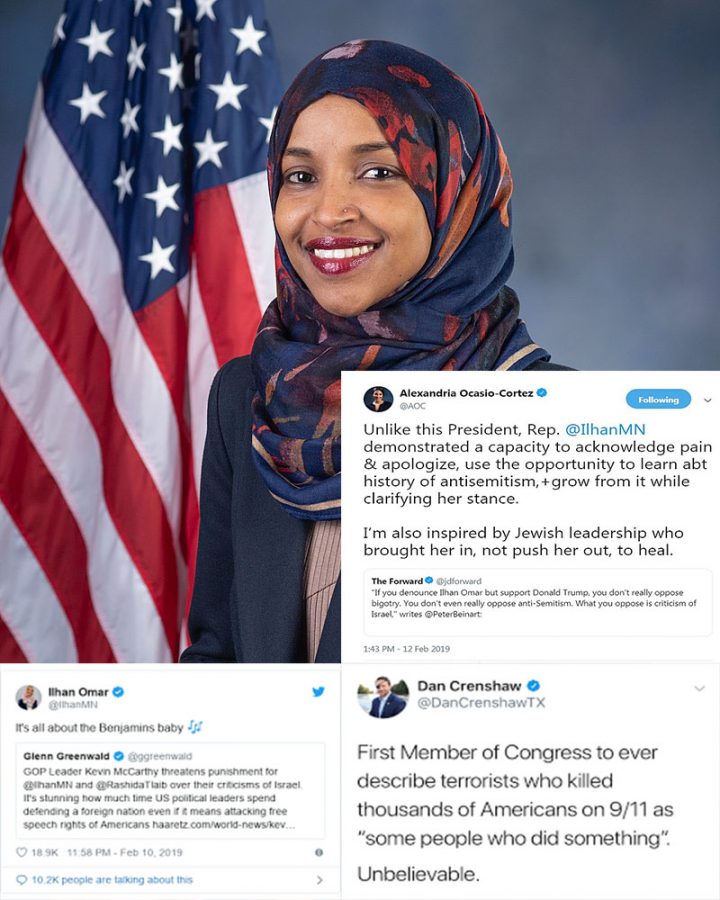Rep. Ilhan Omar comments over Israel and 9/11. What happened?
Ilhan Omar has been under fire for some of her past comments from both sides of the political spectrum. In a tweet, she wrote, “Israel has hypnotized the world.” She also made comments on 9/11. Omar has repeatedly received death threats from people across the country, and has received both criticism and support via Twitter. “I want to talk about the political influence in this country that says it is okay for people to push for allegiance to a foreign country. And I want to ask, why is it okay for me to talk about the influence of the NRA,of fossil fuel industries, or Big Pharma, and not talk about powerful lobby?”
The long-simmering controversy over Rep. Ilhan Omar’s (D-MN) controversial language on Israel has reached a boiling point. Condemnation has came from both sides of the isle with House Democrats even passing a resolution condemning anti-semitism and anti-Muslim discrimination in March.
Omar retweeted a post describing how she and Rep. Rashida Tlaib (D-MI) were facing punishment from House Minority Leader Kevin McCarthy (R-CA) for criticizing Israel. “It’s all about the Benjamins, baby,” Omar wrote in reply. In response to an inquiry of where the money was coming from, Omar replied “AIPAC,” in a tweet.
AIPAC, an influential lobby group, cannot directly pay members of Congress yet individuals working for the organization can. During the last election, individuals from the group donated $21,350 to different members of Congress.
Although AIPAC does not directly pay members of Congress, it does sponsor periodic trips to Israel for members of Congress.
When Omar went to incorrectly suggest that the nonprofit American-Israel Public Affairs Committee (AIPAC) was paying McCarthy to take pro-Israel positions; the American Jewish Committee demanded an apology and called her remarks “stunningly anti-Semitic.” In another from 2012, Omar said that “Israel has hypnotized the world.”
Omar’s had already provoked controversy with comments associating pro-Israel sentiment to the financial clout of the pro-Israel lobby. Then she spoke about the Israeli-Palestinian conflict on a panel with Rep. Rashida Tlaib (D-MI), who, like Omar, is a freshman member of Congress and a Muslim.
Omar doesn’t explicitly identify who or what this “political influence” is coming from other than the pro-Israel lobbying community in general. But given her previous comments, the latest remarks came off to many observers as playing into anti-Semitic tropes about Jewish attachments to Israel making them disloyal to the United States and the trope that Jews are controlling the U.S. political system. Some are no longer willing to give her the benefit of the doubt.
A couple days before the resolution passed, Rep. Dean Phillips (D-MN), a Jewish Democrat, told Omar in a private meeting with about a dozen Jewish and Muslim House Democrats that she should apologize and that Democrats should affirm Israel’s right to exist and protect itself, according to The Washington Post. Rashida Tlaib (D-MI), a Palestinian American reportedly began to cry when she discussed her grandmother’s problems in the West Bank.
Among legislative action, there has been immensely serious response, particularly from the Right. Omar has repeatedly received death threats from people across the country. One man in New York who threatened to shoot Omar was arrested and found to have an immense cache of ammunition and illegal guns.
In early March the House passed a decision broadly denouncing hate, including anti-Semitism and anti-Muslim discrimination. “I want to talk about the political influence in this country that says it is OK for people to push for allegiance to a foreign country,” Omar said at an event. “I have not mischaracterized our relationship with Israel, I have questioned it and that has been clear from my end,” Omar added.
Omar also has vocal supporters in both the Democratic Party and the broader left-progressive community, including some notable Jewish leftists. Her defenders argue she is being attacked in bad faith as a Muslim woman of color who dares to criticize Israel, pointing out that anti-Semitism on the right doesn’t get nearly this much attention.
But they argue does Islamophobia get taken as seriously. Republicans in the West Virginia Legislature put up an Islamophobic poster inaccurately connecting Omar to the 9/11 hijackers, without nearly as much backlash as Omar’s remarks.
It’s also the case that Republican officials frequently call on anti-Semitic associations and say worse about other minority groups without nearly so much bipartisan condemnation.
“I have not mischaracterized our relationship with Israel, I have questioned it and that has been clear from my end,” Omar added in a tweet.
House Appropriations Committee Chairwoman Nita Lowey, (D-N.Y.), tweeted criticism of Omar’s comments in which she called on Omar to apologize because “lawmakers must be able to debate without prejudice or bigotry.”
In a response to the ongoing controversy over Omar’s tweets, she attempted to clarify her position at the Busboys and Poets panel: “I want to talk about the political influence in this country that says it is okay for people to push for allegiance to a foreign country. And I want to ask, why is it okay for me to talk about the influence of the NRA, of fossil fuel industries, or Big Pharma, and not talk about a powerful lobby?”
This comment in turn has garnered some criticism as well with some seeing it playing into an anti-Semitic trope that Jews are disloyal to their country.
“Violence will not bring us any closer to that day,” she wrote in a tweet.

Freshman Ida Pountney is starting her first year on the Southerner staff. Recommended to her by someone at orientation, Pountney hopes that being on the...

